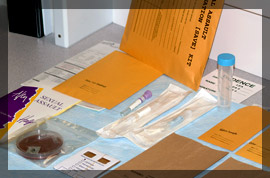Archival Notice
This is an archive page that is no longer being updated. It may contain outdated information and links may no longer function as originally intended.
Home | Glossary | Resources | Help | Contact Us | Course Map
DNA evidence can be used to undermine a modified or hybrid consent defense in a sexual assault prosecution. A modified or hybrid defense is one in which the suspect, when initially contacted by investigators, claims that no act of sexual intrusion or penetration took place. Frequently, when investigators request a voluntary DNA sample from a suspect, the suspect will change his statement and assert that any act of sexual contact which took place was consensual. The typing and confirmation of a match of the suspect's DNA with that found in a rape kit sample may assist in demonstrating the defendant's guilty knowledge of the presence of incriminating DNA evidence. Frequently when confronted with the DNA evidence, the defense often changes its legal theory from one of having no knowledge of the victim to a "consent" defense.
Additional Online Courses
- What Every First Responding Officer Should Know About DNA Evidence
- Collecting DNA Evidence at Property Crime Scenes
- DNA – A Prosecutor’s Practice Notebook
- Crime Scene and DNA Basics
- Laboratory Safety Programs
- DNA Amplification
- Population Genetics and Statistics
- Non-STR DNA Markers: SNPs, Y-STRs, LCN and mtDNA
- Firearms Examiner Training
- Forensic DNA Education for Law Enforcement Decisionmakers
- What Every Investigator and Evidence Technician Should Know About DNA Evidence
- Principles of Forensic DNA for Officers of the Court
- Law 101: Legal Guide for the Forensic Expert
- Laboratory Orientation and Testing of Body Fluids and Tissues
- DNA Extraction and Quantitation
- STR Data Analysis and Interpretation
- Communication Skills, Report Writing, and Courtroom Testimony
- Español for Law Enforcement
- Amplified DNA Product Separation for Forensic Analysts


